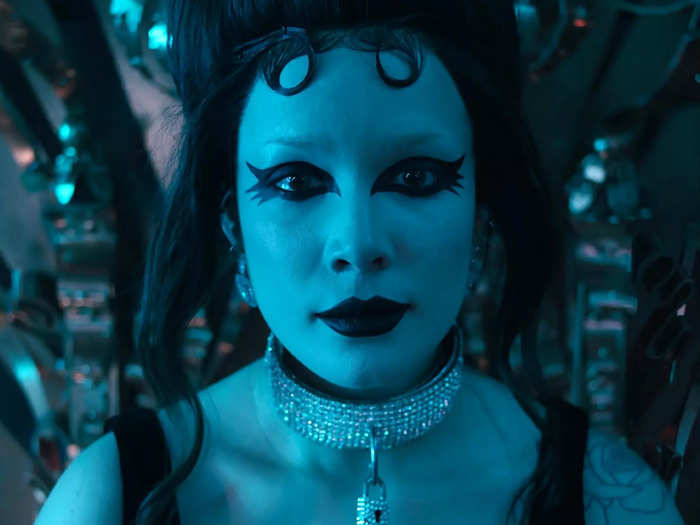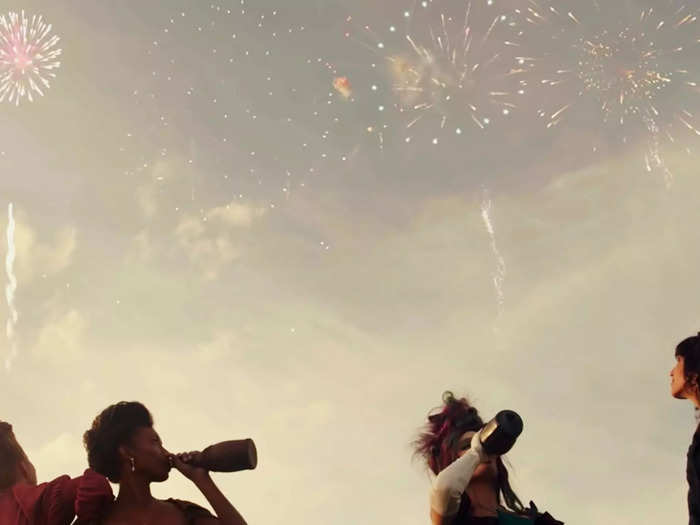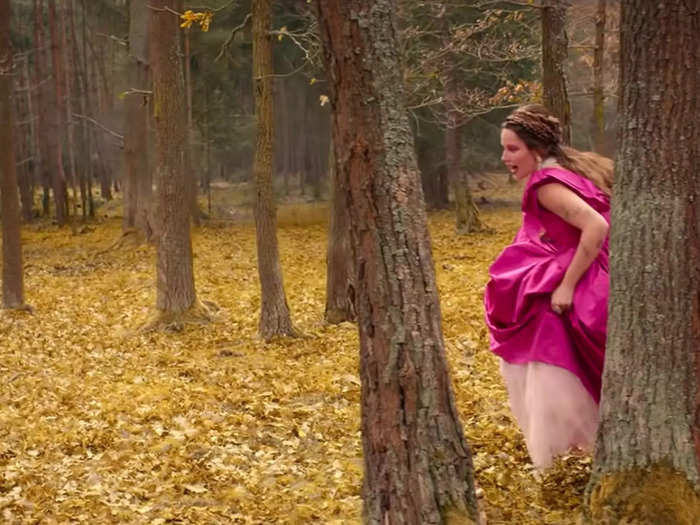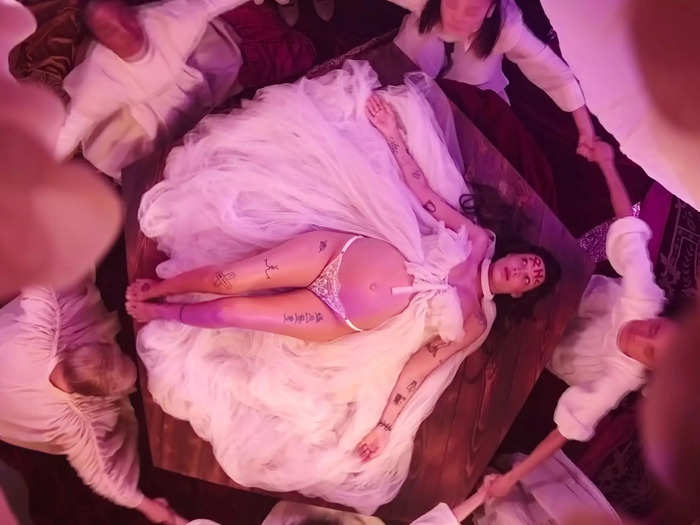- Home
- entertainment
- news
- The best moment on every song from Halsey's new album 'If I Can't Have Love, I Want Power'
The best moment on every song from Halsey's new album 'If I Can't Have Love, I Want Power'

- Halsey released their fourth studio album, "If I Can't Have Love, I Want Power," on Friday.
- It's an ambitious concept album with some of her richest, most vivid songwriting to date.
- Below you'll find Insider's track-by-track breakdown of all the best moments and lyrics.
"The Tradition" introduces themes like exploitation, empowerment, and generational trauma.

I am thrilled by the bizarre phrase "flesh amnesiac" in the bridge, but I think the best moment in "The Tradition" has to be the hook: "Take what you want, take what you can / Take what you please, don't give a damn."
This feels like an evolved, world-wise sequel to "Hold Me Down," the brilliant second track on "Badlands," Halsey's 2015 debut: "Selfish / Taking what I want, and call it mine / I'm helpless / Clinging to a little bit of spine." The song was inspired by male label executives who tried to warp and twist Halsey into the kind of pop star they preferred.
At just 20 years old, Halsey half-sarcastically dubbed herself "selfish," likely as an attempt to reclaim the gendered accusation — to cling to a bit of spine in the male-dominated industry where she suddenly found herself.
Now, at 26, Halsey uses the same sentiment as a mantra — no longer helpless, no longer asking for permission, no damns left to give. It's a delicious full-circle moment.
"Bells in Santa Fe" is an eerie song that hinges on the refrain, "All of this is temporary."

This song is haunting and beautifully written, drawing on varied source material that includes Biblical betrayal and Turkish pet names.
It's the outro, however, that brings "Bells in Santa Fe" to a legendary level. Menacing, industrial synths swell around Halsey's delicate vocals, leading to a tense crescendo — only to abruptly, appropriately, cut them off in the midst of their hymnal chant. All of this is truly temporary.
"Easier Than Lying" is primal and cathartic.

"Easier Than Lying" gets closest to the "Punksey" music that fans have been craving. It's the cathartic feminist rage of "Nightmare" meets the primal glee of "Experiment On Me."
The bridge is particularly glorious, both in terms of structure — a hairpin turn of production that provides respite and contrast — and in terms of lyrical genius: "Losing you is easier than / Lying to myself that you love me."
The deceptively simple couplet flips the tortured thesis of "Lie," the ninth track on "Hopeless Fountain Kingdom," Halsey's 2017 sophomore album: "If you don't love me no more, then lie."
"Lilith" is a hip-hop-infused self-analysis.

In the words of Spin's Ilana Kaplan, "Bravo to the glitchy distortion applied to Halsey's voice when they say 'corrupted,'" but I'm partial to the smirking fourth-wall break in the chorus: "I just f--- things up if you noticed / Have you noticed? Tell me, have you noticed?"
"Girl Is a Gun" embraces both seduction and self-destruction.

The skittering chaos of "Girl Is a Gun" would've buried another singer with less charisma or lyrical skill.
But Halsey commands this terrain with ease, making several daunting vows ("I'm not your daydream, I won't have your baby," "I come loaded with the safety switched off") before delivering the song's most memorable, fatal wink: "Let me show you how to touch my trigger."
Whether it ends in pleasure or violence, that's not her problem.
"You Asked for This" sees Halsey grappling with the consequences of their own desires.

While this song's chorus is a tad repetitive, the tortured dichotomy of "You Asked for This" comes to life during the in-between moments.
In the second verse, Halsey ruminates on the implications of a domestic life she loudly, desperately pined for: "You wished upon a falling star / And then left behind the avant-garde / For lemonade in crystal glasses / Picket fences, file taxes."
Similarly, the juxtaposition of images in the outro is disturbingly effective. Halsey takes a shot of the American Dream, which is laced with the implication of "settling," and then immediately chases with self-destructive pleasure-seeking: "I want a beautiful boy's despondent laughter / I wanna ruin all my plans."
"Darling" is a warm acoustic ballad for Halsey's son.

In terms of this song's best moment, I think I have to state the obvious here: "Foolish men have tried / But only you have shown me how to love being alive." Swoon.
"1121" is named for the date that Halsey found out she was pregnant.

Once again, I have to hand the crown to a very specific, very poignant lyric: "I know the parts of myself that I've hated / And I can't tell which ones are mine / And which I created."
While this could be a reference to pregnancy, which means sharing a body with your unborn child, I hear this lyric as a reflection on perception, self-image, and the destructive effects of fame.
It's hard enough to know if your insecurities are natural, or if they were forced upon you by society's unforgiving glare. When you have critics, detractors, and trolls in your ear and Twitter mentions every day, I imagine it's damn-near impossible.
"Honey" is a pop-punk ode to a former flame.

Again, really love the lyrics here, but I have to hand it this time to David Grohl's formidable drumming skills. He provides the perfect driving force, equal parts precise and feisty, like a memory that returns with a vengeance at 3 a.m.
"Whispers" ruminates on the lies we tell when we're desperate for love.

"This is the voice in your head that says, 'You do not want this' / This is the ache that says, 'You do not want him' / This is the glimmer of light that you're keeping alive / When you tell yourself, 'Bet I could f--- him.'" My jaw literally dropped. Full body chills.
"I Am Not a Woman, I'm a God" is intentionally, ironically anthemic.

Obviously, this gives me "Yeezus" vibes, but Halsey's distinctive introspection stands in stark contrast to Kanye West's unironic strut.
Halsey's work has always been marked by duality — their vacillation between self-doubt and self-worship. 2020's "Manic" saw the enigmatic star searching for peace with a life and brain filled with chaos. Here, she turns her instability into a battle cry.
In the same breath, Halsey confidently calls herself a "god," "problem," and "fraud." Meanwhile, the pounding beat and poppy melody invite you to sing along while Halsey self-immolates, pledging to stop hating their own nature. Compared to passion and conviction, maybe peace is overrated.
"The Lighthouse" is a powerful rework of a familiar metaphor.

In Halsey's poem "Lighthouse," published in 2020, they compared their lover to a mythological siren, whose wail was like "a warning to all ships at sea." While he slept, Halsey imagined herself as the titular tower: lonely, loyal, "kerosene running low."
In "The Lighthouse," Halsey has become the siren, luring liars and leaving them to drown: "Well, that should teach a man to mess with me / He was never seen again and I'm still wandering the beach."
"Ya'aburnee" allows Halsey to make peace with their own legacy and mortality.

In the album's tender conclusion, Halsey delivers one of their best choruses to date: "I think we could live forever / In each other's faces 'cause I'll / Always see my youth in you / And if we don't live forever / Maybe one day, we'll trade places / Darling, you will bury me / Before I bury you."
On top of the moving lyrics, I love a title that doesn't appear in the song itself, but manages to deepen the message. "Ya'aburnee" is an Arabic term meaning "you bury me," expressing hope that a loved one will outlive you, because you can't imagine existing without them. I couldn't imagine a better way to finish this journey.
READ MORE ARTICLES ON
Popular Right Now
Advertisement